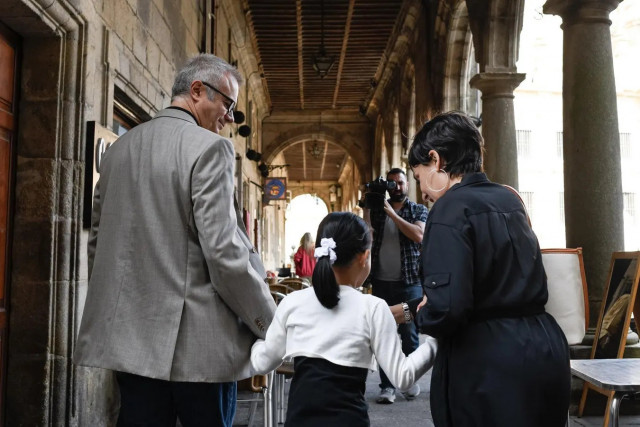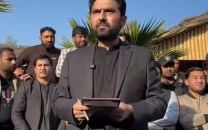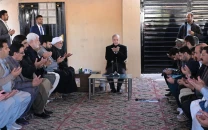Beyond blood: can adoptive love conquer all?
Based on a true story, Netflix's ‘The Asunta Case’ explores the dark side of adoptive family

Before I began watching The Asunta Case (El Caso Asunta), a 2024 Spanish crime thriller miniseries created by Ramón Campos, Gema R. Neira, Jon de la Cuesta, and David Orea Arribas, I was aware that it was based on real events, but assumed that it would be about the kidnapping of a child and how the parents struggled to get the child back. Maybe I’ll learn a few tips about child safety, I thought. Strangely pulled in by Candela Peña [Rosario Porto]’s forlorn face on the Netflix screen, I began watching and in no time, I was pulled in by the enigmatic and mysterious vibe of the show.
So far, I have never been able to watch anything that involves children getting hurt or killed and for three days after I finished watching the series, I couldn’t stop thinking how and why can parents organise their own child’s murder. But wait, this was an adoptive child, which took my mind into another direction. I have always been puzzled, confused and unsure about adoption. Can we love adoptive children like our own? Let’s come back to this later.
Based on the real-life murder-case of 12-year-old Asunta Basterra, the series stars Peña as Porto, the adoptive mother, and Tristán Ulloa as Roberto Basterra, the adoptive father. Their chilling performances have led the six-part series to soar up the streamer’s Top 10 rankings as the number one non-English TV show, leaving viewers shocked and disturbed over its content.
Dropped on Netflix on April 26, it garnered a staggering 5.4 million views, recorded on April 28.
In the very first episode, the show gathers momentum when on September 21, 2013, Porto and Basterra report the disappearance of their daughter Asunta, whose body is found hours after, next to a road outside Santiago de Compostela. The couple are divorced but live around the corner from each other. The girl is in neither apartment and hasn’t called, which is the cause of the parents’ concern that something is wrong.
The police investigation soon reveals evidence that points to Porto and Basterra as possible authors of the crime. In reality, the news had rocked the city and entire Spain, a decade ago. Why would two adoptive Spanish parents belonging to what seemed like a perfect family for 12 years, decide to end their adopted Chinese-born daughter's life?
This accusation instantly overturned their world, on top of which they confronted the wrath of the world and the legal system until they find a way to prove their innocence. But are they innocent?
The series unfolds completely, leaving you to decide who murdered Asunta. Unless, of course, you share my affliction — a touch of Sherlock Holmes syndrome. The moment you realise the story is based on real events, the urge to Google the truth becomes irresistible, potentially spoiling the finale. I succumbed to this urge, yet still watched the series afterward. I was curious to see how faithfully it portrayed the actual events.
Your heart goes out to the girl’s adoptive parents in the heart-wrenching moments where they grieve the loss of their daughter and you start to believe in their innocence and frustration. The series is well-produced and directed, and the acting so good that they all seem like real people, especially Peña, whose portrayal of Porto is perhaps most convincing aspect of the series. In her layered role, she first comes across as a warm and gentle person, and then a traumatised, confused mother on medication for a previous mental condition that is somewhat aggravated after the news of her daughter gone missing.
Tristán Ulloa as Basterra depicts a quiet, possessive and sinister personality. There is nothing much likeable about him. Both the parents are unable to keep their stories straight about the night Asunta disappeared, which made prime suspects.
Another outstanding actor is Javier Gutiérrez as Judge Malvar, the dominating, arrogant and tough professional who leads the investigation. Based on the dysfunctional relationship between the couple, Malvar is convinced right from the start that something is off with them. He actually steers the audience and compels us to believe they are the murderers. Young Iris Whu, as the brilliant and gifted Asunta, has a few scenes but they add a feeling of endearing empathy.
While the editing maintains a perfect tempo, the storyline keeps the audience immersed in a gloomy, yet captivating mood of the series, the support characters and their back stories add a refreshing yet realistic touch of life moving on in all its shades and hues..
The real events
Rosario Porto, the adoptive mother, was a lawyer from Santiago. Her husband, Alfonso Basterra, was a freelance journalist from the Basque country.
Porto’s father had served as honorary consul for France and her mother was an art historian at the University of Santiago, according to The Guardian. During their trial, almost all of the witnesses described Porto and Basterra as model parents.
Interestingly, police sources confirmed to Spanish newspaper El Correo de Gallego that after Asunta’s death, they considered opening a parallel investigation into the deaths of Porto’s parents as there seemed to be valid reasons for that.
Porto’s parents were old, but did not have serious illnesses, and they were cremated without autopsy. Their deaths had left Porto with an inheritance valued at €1.2 million in real estate alone, according to newspapers, that also reported that Porto had pushed her contacts in the court system to expedite the process of cremating them as quickly as possible.
Adoption in Spain
Given the decreasing birth rate and strict adoption laws in Spain, adopting children from overseas was attractive and relatively easy, especially if they could afford €10,000 or more, but adopting from China was still unusual. Why Porto and Basterra chose to adopt from China remains ambiguous.
According to The Guardian, in 2004, the year after Porto and Basterra adopted Asunta, Spain ranked second in the world for foreign adoptions. Apparently, at the time, nobody had done so previously in Santiago, a solidly bourgeois city of 93,000 people. A few Chinese children had been adopted in the wider, rural region of Galicia, with some 2.7 million population. The following year, adoptions of Chinese children peaked at 2,750, with 95 percent being girls. Interestingly, the one-child policy placed an added premium on boys.
According to newspaper reports, adoptive parents of other Chinese children in the region say that the selection process for parents in Galicia wanting to adopt is now exhaustive. Since the Asunta case, China has since tightened its adoption rules. In fact, across the world, international adoptions have fallen to below half their 2004 peak of 45,288, due to concerns about both trafficking and the new levels of protection offered by host countries.
Asunta’s adoption
Being a lawyer herself, Porto and her husband easily convinced the local Spanish authorities that they would make good parents and provide their child with a loving extended family.
The little girl was given a flat that occupied a whole floor of a four-storey block in Santiago’s posh area where the city’s upper middle class resided. The flat was artistically decorated by Porto in blues, greens and yellows and colourful rugs from around the world.
Unfortunately, cracks began to appear in their lives early in 2013, when Porto and Basterra divorced. Porto experienced an acute nervous breakdown that left her hospitalised, perhaps as a delayed reaction of both of her parents passing away two years ago.
The series uses fictionalised parts for coherence and flow as do all series based on true events do because there is too much complex background that cannot be fitted into a few episodes, while still maintaining the dramatic impact.
Since neither of the accused pleaded guilty, the motive behind the murder remains unclear even in real life, as does the niggling feeling that Basterra was a paedophile or that Porto had murdered her parents or that the couple killed their daughter for money.
And this set my mind into a frenzy of thoughts. Can one love an adoptive child as their own?
There have been cases in which children are murdered by adoptive parents, but these are exceedingly rare. In the few instances where parents have killed their children, the crime is typically the result of a moment of rage or overpowering feelings of inadequacy.
Biological parents have killed their children too for mental or financial reasons, as seen in newspaper reports every other day. The sad reality is that mental breakdown, divorce and financial issues can break a family and affect children. But however difficult things might get, one wouldn’t get tired of one’s own child like you would with an adopted child, or would you? Even though humans come in all shapes, sizes and types — Mother Theresa, Nelson Mandela, Jack the Ripper and Adolf Hitler, and Narendra Modi, some humanitarian and some anti-human. But at the end of the day, isn’t blood thicker than water and doesn’t the umbilical cord connection between mother and child mean anything? Isn’t the painful and life-altering process of childbirth ordained/designed for the reason that when something comes to you out of your own flesh after so much pain, mystery and patience, you cherish it far more than something living and breathing that you purchased for yourself? I haven’t got my answers, but I’m working on them.
For those who prefer to watch the miniseries without Googling the case, it’s definitely binge-worthy.



















COMMENTS
Comments are moderated and generally will be posted if they are on-topic and not abusive.
For more information, please see our Comments FAQ